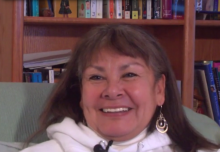
Born: Detroit, Michigan. May 8th, 1948.
Currently a social worker in the Cesar Chavez Academy High School in Detroit, Michigan, Maria Anita Guadiana’s involvement with activism and social justice started young with the help of her father, Jose Guadiana. Born in May 8th, 1948, she was the only daughter to Jose Guadiana and Maria Guadiana who had four boys before Guadiana was born. Guadiana cites her father’s organizing with cultural and civic organizations in Detroit and the fact that she grew up in a household with only male siblings as a major influence on her self-identity as an independent and culturally driven individual, regardless of her gender.
Guadiana graduated from high school in 1966, and it was not too long after that she started becoming conscious of social justice issues and social movements. The 1960’s were a time of growing awareness for Guadiana because of figures such as Cesar Chavez and Martin Luther King Jr. who was assassinated in 1968. Her involvement with the 1968 presidential campaign of Eugene McCarthy (who was against the US involvment in Vietman) really opened the doors to her future involvement with the Chicano movement.
As a result of her connections with Thomas Gonzales and his involvement with the Catholic Workers movement, she attended her first rally for the grape boycott in Detroit, Michigan. She attended the 1969 Brown Barets Convention in Los Angeles, California, with the Detroit Chapter of the Brown Berets, which she had helped organize. Then in 1970, she attended the Chicano Youth Conference in Denver, Colorado. As a Chicana from the Midwest, she had always felt as though both herself and her Midwestern peers were considered outcasts in comparison to the organizers in the southwest United States.
In 1972, Guadiana was in the first cohort of Latino en Marcha, which was an initiative to increase the college attendance of the Latino community in Detroit. Not long after, she was hired as one of the community organizers focusing on Latina/o education issues in Detroit. This project did not pan out, so Guadiana worked many clerical jobs for companies around Detroit, which pushed her to go back to school. With her great background in community activism, she was admitted into the Wayne State School of Social Work and earned her MSW in 1978.
In Detroit, Guadiana became the director of the senior citizens program at LA SED (Latin Americans for Social and Economic Development). She later forged a career in geriatric social work that took her to various communities around Michigan, but eventually, she found herself working with high school populations in Battle Creek, Michigan. Once she saw that there was an opening at the Cesar Chavez Academy High School in Detroit, she returned to her native city and has been working on behalf of students there ever since.
